Over the Edge: An Interview with a City Abseiling Business Part 1
We delve into what it takes to be an abseiler, with this interviewwith Anaru Kerei and Beth Dugdale, directors of Wellington Abseiling Maintenance (WAM).
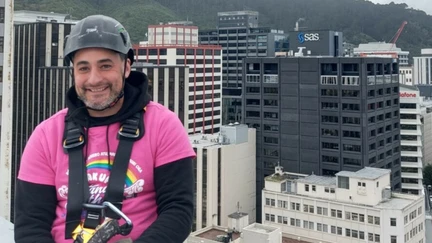
This is part one of a two part interview. In this interview we speak to Anaru Kerei and Beth Dugdale, founders and directors of Wellington Abseiling Maintenance (WAM). In part two we interview a former employee, Enzo Fantone.
If you work in an office building in Wellington’s CBD you’ve probably seen them: the guys who appear at the window, high above street level, suspended on ropes with squeegee in hand and bucket hanging off their harness.
The capital’s high rise window cleaners are a specialist group. It takes nerve and a good head for heights, along with a conscientious concern for health and safety to abseil down a wall of concrete and glass, cleaning and maintaining as they go. Then there’s the challenges brought about by the capital’s variable weather.
WCL: Anaru, tell us a little about your background, your qualifications and your years in the industry. How did you get started in abseiling?
Anaru: My father owned a telecommunications rigging company so we used to build cell phone towers. Me and my friends used to go out with him during the [school] holidays and help him work on the weekends. From [age] 16 we were building 80 metre wind measuring towers out in Featherston. Eventually with telecommunications, because of the way we use data now, they had to go onto high-rise buildings [and] we had to abseil to get there. We naturally progressed from building towers to coming into town to put antennas on buildings.
Eventually I jumped into another abseil company where I learnt about the different aspects of abseil.
A lot of it was self-taught. There’s a lot of “can-do” attitude in abseil. So we just had to get out there and learn as much as we could. By working for a few different people and learning how they did things and learning how we wanted to do things.
WCL: Have you formalised that now with training and qualifications? You mention your staff are all IRATA trained.
Anaru: IRATA training is purely a rope access qualification and that’s the only formal qualification that they have.
Beth: They are like jack of all trades on ropes. There’s a qualification for the rope access getting down the building but everything that you perform on the rope, it’s a learn as you go situation.
Even window cleaning – there’s an art to that that’s very underrated.
Anaru: Yeah, it’s under-appreciated. I think one of the hardest things to do on ropes, to clean windows, because if the building has 800 windows and you get one wrong, there’s a chance you will need to go back and fix it. The expectation on window cleaning is huge.
Beth: We did a furniture removal from an apartment building in Oriental Bay. A lady couldn’t get her couch out of her apartment and it had to be abseiled down the building.
Anaru: It was only about five stories up. We had to actually take the window out to get the couch out because they couldn’t get it through the door.
But we try to train our staff as much as we can. Our staff are full-time and we need to find work for them to do when it’s raining so we try and train them on wet days with the different scopes of work we do.
We run teams of two, most of the time and we have one experienced and one green. We try and cycle the people around so they all get to learn from each other.
Beth: It’s a good buddy system, we do send them on specialised courses. We put them through EWP – Elevated Work Platform training course, which they get a certificate for. We also put them through an asbestos awareness training course, because there’s a lot of that around on the exterior of buildings.
And of course, first aid. They all have their IRATA logbook back at the office and get them signed so they can progress through their levels.
WCL: Why set up your own business and employ a team of people?
Anaru: I always knew I wanted to be self-employed. I didn’t like working for other people and how they were doing things so we decided to do it ourselves.
"Our philosophy is to employ good people and to teach them how to abseil. You can teach just about anyone that’s willing, to abseil. Or to do the work on the tools, but it’s very hard to train someone to have the right attitude."
I just want good people. We want good people around us. Good honest people.
Beth: I’d say we’ve curated quite a unique and special team. We’ve got a really professional and polite team. A lot of the feedback we get from our customers is about how polite our team are. We’re going into offices, and sometimes residential apartments, they’re always well presented, they’re tactful. It’s really important how people come across when we interview them.
Anaru: Yeah, it is important for us. We want to enjoy our time at work and you’re not going to enjoy it if you don’t enjoy the people you are working with.
"I was at the marae with all my whanau recently and I think a lot of it comes from how my family work on the marae. That’s how I want my business to run. Because they’re always looking ahead and doing everything they can do to help everyone, just trying to make it as easy as possible and as welcoming as possible. That’s a huge part of how I run a business and I didn’t really realise I did that because it just happens. It’s natural. It’s how I was brought up. So that’s how we do things."
WCL: How big is your team?
Beth: Currently, with Enzo, there’s thirteen of us. We’ve got three subcontractors and the rest are full time employees.
WCL: How hard is it to find the right people?
Anaru: We’ve been lucky. Because I’ve been in the industry for so long I know quite a few good people, or like Enzo, just turn up at the office and ask for a job. As our team grows, the network grows and we’ve recently had quite a few enquiries about work.
Beth: We are visa accredited. We have Lynette on the team. She’s from Papua New Guinea, so she’s working towards her residency under us. Although we are visa accredited, we get really excited about being able to offer job opportunities to people and to young people in Wellington as well. That’s a really cool thing to be able to do. We’re really proud of that. We definitely try to reach out locally, or through word of mouth.
WCL: You mention Lynette. How many women do you have? Is she a rarity?
Beth: I would say, yeah, there aren’t many females in the abseil industry so it’s always awesome when you get one apply.
WCL: Is that because it’s seen as risky or macho?
Beth: I don’t think there’s enough exposure to a career pathway. I don’t think people look at it and [wonder] “Oh gosh, could I do that? How long could I do that for? Is it just going to be for a summer or is it something I could progress in?”
So, we have a career progression chart we give people in their induction pack when they first start. It just shows that they can go from being a trainee rope technician all the way through to an operations manager. We can take them through various avenues to teach them more the administration side, looking at how jobs are broken down and how they’re quoted and all sorts of stuff. So, they can actually see “I could stick with these people”.
WCL: You’re prepared to develop the right people?
Anaru: We set aside a training allowance, per employee, per year, plus we pay for their time to do it. It doesn’t have to necessarily be an abseil ticket. If they want to learn something that’s going to help the business and progress their career then we will sort that out for them.
WCL: Aside from a head for heights, what other qualities do people need?
Anaru: Obviously someone who is adventurous and gets bored quickly. Because people who get bored quickly learn quite quickly as well. They’ll dive into one thing get passionate about it and then they’ll want to learn something else. And I normally find that they’re the best abseilers because they’re always curious, always willing to learn. That’s the sort of attitude we need because we are doing a wide scope of work. So being able to take all that information in and being able to apply it properly is quite difficult.
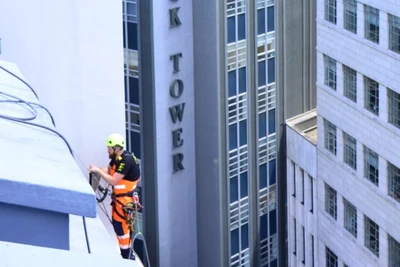
Photo courtesy of Enzo Fantone.
A WAM employee on the job.
WCL You mention before about the weather providing you with down days to do training. This is Wellington. At what point do you assess a situation and think “No we won’t be working today”?
Anaru: We leave it up to the staff. It’s important for them to make sure they know when they can and can’t abseil. Obviously when it’s too windy I’ll say “Nope, you’re not getting on the ropes today” but it’s up to them to do their own risk assessment.
Beth: There are workarounds. You’d be surprised how few days we have to say “No. No-one can work today”. Often there are a few jobs on the go and if there’s a nor’westerly then the southeast face is sheltered.
Anaru: Or sheltered by nearby buildings. Or there’s work outside Wellington we can pick up. We’ve got roof work as well. There’s a difference between being too windy to be on a roof and too windy to be abseiling.
WCL: Do you also do emergency, safety, security work when it comes to roofs?
Anaru: We do emergency work. If a flashing is going to blow off or something is going to come down and hurt somebody then we will look at it, if we can do it safely we will.
Beth: Even just getting up there for an inspection puts people’s minds at ease.
Anaru: It’s safer for us to get out there with ropes and put a couple of screws into something or whatever it takes to make sure its secure
WCL: Do you still get scared?
Anaru: Oh yeah. As I get older the fear definitely affects me more. Because I haven’t been on the ropes much this year I’m more cautious about how I’m doing things.
WCL: Isn’t that a good thing?
Anaru: If you’re not scared then you shouldn’t be on the rope. You shouldn’t be an abseiler, because people like that will take way more unnecessary risks.
Beth: You can’t get complacent.
Beth: People often say “Isn’t it so scary? Don’t you feel scared to do it?” But Anaru said to me once, he feels safer on the ropes with someone he trusts one hundred percent than he would on a building site with 200 people with power tools. So in terms of accidents on the job, touch wood, there are very few. You’re with that one person you trust, and they have your back, so there’s that culture as well.
Anaru: It’s important to note that in abseil there’s not that many accidents. What we are doing … people think it’s high risk, and it is high risk, but we have multiple safety systems in place so the likelihood of an accident is so low
We try to make safety as practical as possible.
WCL: You have to be adaptable and read the situation?
Anaru: Yeah. I need someone that has the capability to deeply understand rope access, not just think they do.
Beth: It’s quite nuanced. You have to have initiative.
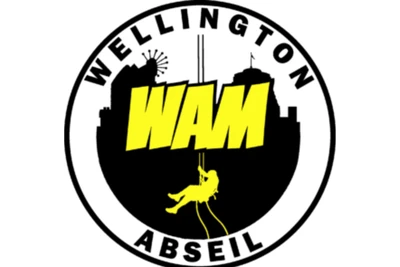
Logo provided courtesy of WAM
WCL Do you advertise? Do you tender for maintenance contracts? How do you get work?
Beth: We do invest in good sign writing on our vehicles that leads to a decent amount of work. There’s other work where people come directly to us. We do have a website and that’s been a pretty good investment. Work comes through both of our networks. 17 years of hairdressing before I jumped on board to help Anaru with the office has given me a varied network.
We go around at least once or twice a year and we take morning tea to our clients, sit down and update them on our goals and vision. We also ask what we can do better, it’s important to get feedback from customers. Normally a cake gets people talking. We also have a capability statement that we print out for new customers.
"We take a lot of pride looking after our clients and our stakeholders."
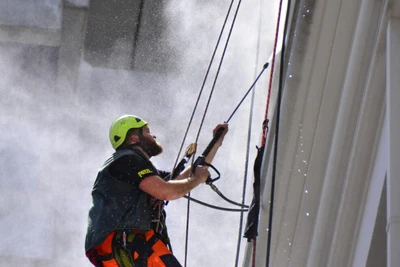
One of the WAM team at work. Photo courtesy of Enzo Fantone
"A lot of people think abseil = window cleaning. They don’t also know we can do glazing, painting, leak repairs, tiling, concrete repair, any issue with a high rise building we have repaired."
So it’s good to have that face time to explain that, they really appreciate it. That’s what sets us apart, that we’re just not on the other end of the email but we really try to make that effort to go and give people our time.
Anaru: At this stage in our business, because of the size of it, I’m still over everything, so our customers know that I’m going to be directly involved in every job. I’m always looking up at all my customers’ buildings, looking for things that need to be fixed. And if we fix a leak, we follow up to make sure that it is fixed. Because we care about what we’re doing.
Enzo walked in the door at the perfect time because we had a staff member going on a three month holiday and that worked out really well because he was looking for three months work.
Which is a bit risky for a business, to take someone on for a short period of time because you are literally just training that person [only to have them move on].
But I took him on a job, and I was watching how he did things, and I knew he was going to be able to do it in the time scale we had.
WCL: Speaking of Enzo, his first day on the job wasn’t without incident. Would you like to tell us about the water bottle and cherry picker and what was learned from that?
Anaru: I was working up in the cherry picker because we were washing a building and Enzo put his drink bottle on the leg of it. A cherry picker has legs that go out to stabilize and level it before we go up. When we had to move it, the leg came in and crushed the drink bottle. The drink bottle didn’t break at all, the drink bottle was fine, but it crushed the hydraulic lines on the cherry picker and hydraulic oil went everywhere. I looked down at him and thought “What have I done? What have I hired? Have I made a mistake?”
With stuff like that I’ve got to look at it and be like “Well, I never thought to tell him not to do that”. It was his first day and he would have been under pressure, he would have been nervous. These mistakes happen and it’s about making sure we include it in our health and safety systems.
Beth: We say there’s no stupid questions because if someone feels like they are in an environment where they are too scared to ask you something then that’s unsafe as well. That’s when accidents happen.
We’ve got him a replacement drink bottle for his leaving gift.
Anaru: We look after each other, we trust each other. I said to the team this morning that if you ever need to talk about anything it’s an open-door policy here. You know you can say whatever you want and we will listen and implement whatever has to be implemented to make it work. We’re always trying to do that as much as we can.
WCL: You started your business in 2019. Then came Covid. How were you impacted?
Anaru: At the time it was only just me and one other. We were really lucky with the whole Covid thing because we landed a huge job and got it 80 percent finished before the lockdown. That carried us through without any real dramas.
There was all the PPE and all the Health and Safety stuff we needed to buy, that wasn’t really allowed for in any pricing but we got lucky. Lockdowns gave us time to sit and reflect about what we wanted.
Beth: The impact was more around keeping our staff safe going in and out of residential apartment buildings, masking up, sanitising everything.
WCL: Did you apply for the subsidies?
Beth: Yeah we did, later on. We initially thought we might be able to work during lockdowns but we weren’t essential workers. So we got the subsidies and that definitely helped.
WCL: Can you share your long term vision for the company with us?
Anaru: We want to grow, but we are very careful about growth because of the impact it has on everything. We’ve grown a little bit this year.
Going forward we are trying to grow inward and make sure our people are learning and doing as much as they can for their growth and ours.
We are starting up a new roofing business. We’re going to get licensed for membrane roofs. If we have good people who want to start their own businesses we will help them as a subsidiary of WAM. We haven’t got it all worked out yet, but I think it’s better, once you get to a certain size, to have one person with a bit of skin in the game. You retain quality as you grow.
If you have a smaller subsidiary and the guy at the top is only managing six to eight staff, he’s got a way better chance of making sure the people coming through are given enough time to learn.
Beth: People feel a bit more looked after and special in those kinds of teams, rather than getting lost in a big thing. We try and do lots of little touches for the team. There’s a bonus each month if we meet our target, we bring the doggies and the kids during the school holidays. I always like to bring snacks and treats. I think that goes a long way.
Anaru: There’s a lot of good interactions between our staff, they’re really supportive of each other, they’re always looking out for each other.
Anaru: We just want to hold on to that as much as we can. The more numbers you get the harder it is to hold on to. But it can be done. That’s another reason why we want the subsidiaries, so the person at the top can make sure they’re looking after their culture and if they’ve got skin in the game, it’s better for everyone involved with that subsidiary, because they know the person at the top is getting something from it.
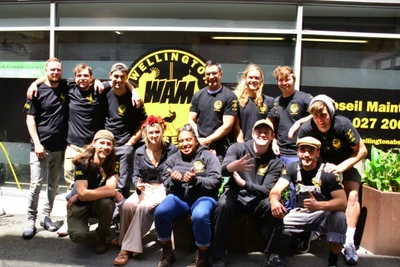
The WAM team. Photo courtesy of Enzo Fantone
WCL: The culture of caring is definitely overlooked in many businesses.
Beth: I started a Facebook and Instagram page and that wasn’t with the intention of gaining commercial abseiling customers because I don’t think they would look on social media for an abseiling company. It was with the intention of showing “Hey, we’re a really good team”. That’s what an employee would look for – they would look on Instagram or Facebook and think “Do I want to work for these people?” So we post bits now and then. [The team] enjoy taking photos and sharing them.
Beth: We’ve got two children and they asked that the team wear pink shirts and abseil in Wellington on Pink shirt day, the anti-bullying campaign. Our daughter changed the sign from “Men working above” to “Persons working above”. Little things like that go a really long way.
WCL: What would you say to someone thinking this might be a suitable work choice?
Anaru: If you’re thinking about getting into abseil just make sure you’re passionate about it because it can be seen when you walk through the door. Make sure it’s something you want to do.
Beth: I would say there is a career pathway there. It doesn’t have to be something you think “Oh I’m going to do this for a year maybe, or a gap year or to fill in time”. There can be steps to a career and that it is quite multi-faceted and it can take you into management positions.
Anaru: Or offshore, overseas.
Beth: The qualifications are internationally recognised so there’s opportunity there.
Anaru: We want to try and get into a career expo and one of my long term goals is to try and get some sort of apprenticeship going somehow with abseil to try and formalise it a bit more because I think it’s important for the industry.
Anaru: People were asking me at the weekend why I do it as well, and I think it’s like the fun-est trade job available. Which is why most people get into it, because they are excited by it.
WCL: Why Wellington?
Anaru “It’s cool being in Wellington. I grew up here and Mum’s family are from here. We went to Wellington Zoo [with our kids] and there are some pieces of art done by one of my cousins.
There’s photos of my uncle in the Reserve Bank and there’s influences from my family around Wellington so it’s nice being there and seeing that.
Seeing my cousin’s art around the place. Another cousin owns a moving business. My sister and her partner run a substantial bread run business. A lot of my family and friends are self-employed and doing well. They’re still connected with their Maoridom but they also run businesses. To get that balance right is so hard, I draw a lot of inspiration from them, knowing that they’re doing that, I’m proud that my family is putting a lot of positive reinforcement out there for Māori.
WCL would like to thank Anaru and Beth for their time and cooperation with this interview. Next week we present an interview with former employee Enzo Fantone, and look at his journey into abseiling.
If you would like to learn more about the business concepts discussed in this piece have a look at these resources held by Wellington City Libraries.
The retention revolution : 7 surprising (and very human!) ways to keep employees connected to your company by Erica Keswin, 2023. Also available as an ebook
Bids, tenders & proposals : winning business through best practice by Harold Lewis, 2007
Tenders and proposals made simple by Rodney Overton, 2001